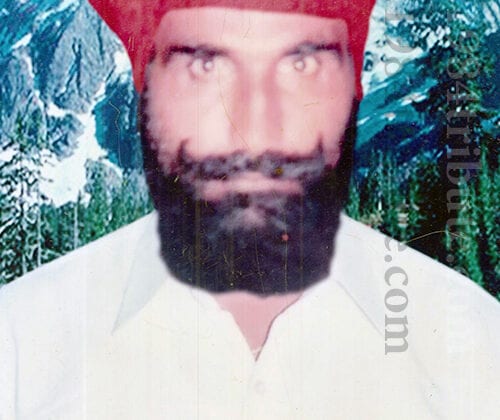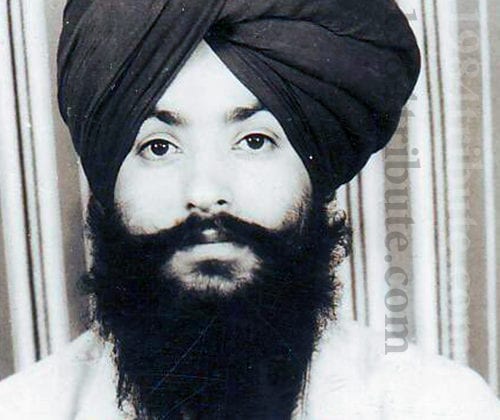Shaheed Bhai Sukhwinder Singh Sewewala
Shaheed Bhai Sukhwinder Singh Sewewala
Khalistan Liberation Force
Saddi Kaum Diyan Raghaa Vich Shaheeda Da Lahu Chalda
Likhaya Lahu Nal Janda Ithiaas Sadda
Shaheeda Karke Hi Sadi Kaum Jiondi Hai
Shaheediyan Pauna Shounk Hai Khaas Sadda
In the Sikh armed struggle for a separate Sikh homeland Khalistan, many Sikhs faught the oppressing Indian security forces bravely and became martyrs with their names written in gold in the Sikh history. Amongst the thousands of martyrs of the Sikh panth is one shaheed singh by the name of Shaheed Bhai Sukhwinder Singh Sewewala.
Bhai Sukhwinder Singh Sewewala was born on the 6th August 1969, in the house of Sardar Sudagar Singh Sandhu and from the womb of Mata Surjit Kaur, in the village of Sewewala Gumty Khurd, near the Jeto area. Bhai Sahib was the youngest of 5 brothers and older than one sister. Bhai Sahib studied up until 10th class at the local village school and after took admission in the Baljindra College of Faridkot, where Bhai Sahib passed +2. From childhood Bhau Sahib was deeply connected to Sikhi, Bhai Sahib would cut out the pictures of Sikh Gurus from newspapers etc and keep them within his study books. Bhai Sahib never spoke too much with people.
Bhai Sahib may not have met Sant Jarnail Singh Ji Bhindranwale, but the attack on Sri Harimandir Sahib by the Indian army in June 1984 had changed Bhai Sahib forever. Every single word of Sant Jarnail Singh Ji Bhindranwale’s speeches was a challenge to the Sikh youth. Bhai Sahib listened to Sant Ji’s cassettes on regular basis. Wherever Bhai Sahib saw the Sikhs suffering from slavery, he felt the need to free his nation from the shackles of slavery, even if this meant martyrdom. Upon hearing these words of Sant Jarnail Singh Ji Bhindranwale, Bhai Sahib decided to dedicate his remaining life to the Sikh Freedom Movement and pay of all the debt that India has put upon the heads of the Sikhs:
“Until you Singhs don’t get weapons and take responsibility,
we will not be able to come out of this slavery.”
Sant Jarnail Singh Ji Bhindranwale
Now Bhai Sahib started to establish links with the local Khadku Singhs and winning their trust. First Bhai Sahib met Bhai Neka Singh Bishnandi and started doing actions but Bhai Sahib had not yet left home. Bhai Sahib managed to do sewa for a long while as he did actions under a different name. The best tactic for a Jhujaru Singh is to never disclose their name and information with anyone in the armed struggle. People who drop their real names and do actions in secrecy last very long and people who want acknowledgement face many dangers and are easy to be hunted. The brave warriors do actions and even the Indian security forces can’t recognise those singhs after they escape, such singhs don’t arouse suspicion amongst even the normal public.
To be successful in an armed movement, one must know all the battle tactics. Wars are not a game of hide and seek, war means to cause as much damage to the enemy as possible. Singhs that cannot control their anger and emotions tend to fall in the trap of the enemy. In the Sikh Freedom Movement Bhai Sahib also remained calm and lived the life of an average citizen within the society.
During this time, the police of Jeto randomly came to Bhai Sahib’s house to question him as Bhai Sahib was a Sikh youth. Fortunately Bhai Sahib was not at home, but the police told Bhai Sahib’s family to present Bhai Sahib at the local police station as soon as possible. When Bhai Sahib came home that day, the family told Bhai Sahib what had happened. Upon hearing this, Bhai Sahib straight away went to the Jeto police station and presented himself to the police. After answering all the questions and crushing all the suspicion of the police force, Bhai Sahib was free to go home without being charged.
Two weeks after the Jeto police issue, on 30th July 1990 Bhai Sahib’s group including Bhai Neka Singh Bishnandi had a fierce encounter with the Indian security force on the outskirts of the village Godara which is close to Jeto. In this encounter, Bhai Neka Singh Bishnandi attained shaheedi but using his mind, bravery and an empty revolver, Bhai Sahib managed to persuade the CRPF personnel to surrender their weapons, after which Bhai Sahib grabbed a Stengun and made his escape. After this encounter Bhai Sahib went underground as his identity card had come into the hands of the CRPF from the sight of the encounter. Now the Indian security forces knew that Bhai Sahib was involved in actions.
Bhai Sahib now joined the Khalistan Liberation Force under the command of Jathedar Gurjant Singh Budhsinghwala and once again jumped into the battlefield against the Indian security forces. Bhai Sahib had also stopped visiting home secretly, but the family were still awaiting Bhai Sahib’s return to a family life. Once Bhai Sahib’s family met him and said, “We want to present you to the police, we have spoken to the MLA and he would help us.” Bhai Sahib answered, “I am not coming home, nor do I want you to talk to anyone on my behalf.”
A mans greed, is his weakness of which the enemy take full advantage of. If a man needs to be caught, we can so through his greed. There are many types of greeds, greed for money, greed for fame, greed for a rank, greed for others sympathy etc. not everybody can control their greed, soon as the greed is exposed to the enemy, the enemy an use it as a weapon against the person. Bhai Sahib was above all these greeds, he was like a pure jewel who wanted to sacrifice himself for the panth entirely because of his love for Sikhi.
For example, once the singhs Khalistan Liberation Force required Bhai Sahib to take the rank of Lieutenant General, but Bhai Sahib denied the rank and instead helped Bhai Pargat Singh Sangatpura get this rank. Then again the chief of Khalistan Liberation Force gave all the singhs 20,000Rs to give to their families, but Bhai Sahib also said no to the money. Bhai Sahib was suspicious that fellow singhs might send the money to his family without telling him, for this reason Bhai Sahib met his family and said, “I am not going to take any money from you, nor am I going to give you any money. If someone comes to give you money, you must not take it.” Bhai Sahib was very far away from the greed of fame, that even after doing so big many actions, he never took responsibility in the newspapers. Every time Bhai Sahib did an action, he always planned not to be highlighted by the media. In the thousands of Jhujaru actions done without any responsibility, only god knows how many Bhai Sahib had his hands in.
Finally the day came when Akaalpurakh was going to give Bhai Sahib the rank of Amar Shaheed, a rank that Bhai Sahib had been waiting for. On 30th July 1991 Bhai Sahib was staying at a house near the Bhanmipuri village. All of a sudden the Indian security forces surrounded the house in which Bhai Sahib was staying, due to a lead given to the police by an informant. Bhai Sahib had promised himself that he will not come into the hands of the police alive. When Bhai Sahib saw the Indian security forces surrounding him, he analysed that there was no escape and if he started an encounter the family whose house he was staying at would also be killed. Upon looking at all the options available, Bhai Sahib decided to attain shaheedi by swallowing a capsule of Sy-Nyde and received the rank he had been waiting for, Amar Shaheed.
The status of Amar Shaheed is only given to those Jhujaru Singhs who Akaalpurakh assign the mission of panth’s freedom and to maintain the honour of the panth. The martyrdom of such truly brave warriors takes a new life within the Sikh history.
In 1699, when Guru Gobi Singh Ji created the Khalsa panth, he had put out conditions to the people who wanted to be the Khalsa, that king will either be a king or a revolutionary. Guru Gobind Singh Ji also said that dishonest, weak, coward, scared and greedy people have no place in the Khalsa panth. Only a person with the mind-set of freedom can be a king or a revolutionary. Ones who adapt to slavery cannot be a king and rule nor can they be revolutionary and fight.
Khalsa Panth Vich Je Parvesh Karna
Ta Pehla Sabak Eh Parh Lavo
Badshah Ban Ke Ja Raj Karna
Ja Fir Baagi Ban Ke Larh Maro
Khalsa Fatehnama – July 2013











